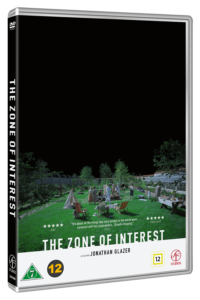Director of Sensational Propaganda Film Goes Rogue At the Oscars
The recently released and still in theaters Oscar-nominated historical drama, “The Zone of Interest” centers on Nazi commander Rudolf Höss and his family and the idyllic life they were living during WW2. Just on the other side of their picturesque garden is the Auschwitz concentration camp. A film purported to shed new light on the alleged dark deeds of Rudolf Höss has garnered much attention and praise as of late, landing its director, Jonathan Glazer an award at the Oscars.

But the film in and of itself has become a bit of a “zone of interest” ever since Glazer went off the rails during his acceptance speech, by using his platform to rail against the rampant abuse of the Holocaust narrative to justify and excuse what would normally be universally decried as evil acts. While accepting his Oscar award Glazer said,
“Our film shows where dehumanization leads at its very worst…We stand before you as men who refute their Jewishness and the hijacking of the Holocaust as justification for an occupation that has led to conflict for so many innocent people.”
It’s rare indeed for any devotee of Holocaust orthodoxy, much less a purveyor of it, to have such a moment of lucidity and candor—and our gripe with Glazer notwithstanding and his penchant for glazing over the facts about the Holocaust, we’ll gladly give him credit where it’s due here, in being able to see how his work is being used to oppress people, and not for the noble cause he presumably fancies it to be in service of.
Perhaps the biggest reason this film is being praised is its novel approach in performing the sacrament of Holocaustology that is bewailing the official narrative through the film’s sound design and portrayal of a serene and idyllic setting just beyond the wall shielding them from alleged unimaginable horrors. Never showing the audience the actual inside of the camp, and instead focusing entirely on Rudolf Höss and his family blissfully enjoying their lives, while just beyond the wall to the courtyard of their home, the audience can hear the inmates of the camp being liquidated by the Nazis. This approach caught flak from some, but overall garnered praise for its new take on telling the world “never again.” In his acceptance speech Glazer also stated that the purpose of the film wasn’t so much to say “look what they did” as “look what we are doing…” This theme of exploring how people in general can be so prone to looking the other way while evil is committed in and of itself is a very relevant one, just not precisely in the way those who are praising the movie think, seeing as how in their blind acceptance of the official Holocaust narrative, they themselves glibly look the other way while monstrous inhumanity is allowed to rage out of control without hindrance or opposition. Glazer recently said in an interview with CNN about the film,
At its core “The Zone of Interest” is about what we choose to pay attention to — and what we’re able to ignore.
Perhaps the irony of that statement is lost on Glazer, seeing as how he is the die-hard proponent of Holocaustology that he is, and in so doing, seems to find himself quite able to ignore the fact that most all of the mainstream so-called knowledge of the Holocaust is the product of wartime propaganda, and confessions obtained through torture, established and codified by the farcical Nuremburg Tribunal; and not pay attention to how just on the other side of the wall of the official narrative those who dare to question it are subjected to the most vicious forms of dehumanization and positively Orwellian censorship.

He and his peers are very able to ignore that copious amounts of research into the real history of World War 2 by Revisionists has proven rather thoroughly that there is indeed quite another side to the story, and that the official narrative is not dominant by proof of its merit and veracity, but by iron-fisted suppression of open discussion and debate.
Regardless, this whole series of events has highlighted once again the absolute imperative for open and honest discussion of the Holocaust. While Glazer deserves credit for his bold stance against the brutalization of the Palestinians by the Mossad, IDF, and Israeli government, his film is little more than a new spin on the same tired old tropes of Holocaust orthodoxy.
As it so happens, we have an entire book from our prestigious Holocaust Handbooks series devoted to addressing these tropes in triplicate. Namely the man the film portrays: Rudolf Höss and his actual legacy as the commandant of Auschwitz. The irony and lack of self-awareness in Glazer’s comment about what his film is really about is exemplified in the fact that the strength of Glazer’s conviction that he is performing a service to humanity with his film is predicated on the monstrous inhumanity Höss was subjected to in the form of the torture that forced the confession out of him that supposedly so undeniably condemns him. One of many things that the reader of this book will gain a new or at least heightened understanding of. No propaganda. No emotional blackmail. Just the real history. Since this movie is probably going to be a hot topic for quite awhile, we’d best be getting informed and sharing this information with everyone we can.
With these events that have recently transpired and the controversy swirling around them, we’d be remiss to neglect to point out that there’s quite possibly never been a better time for you to add HH35: Commandant of Auschwitz to your library if you don’t yet own it, or to procure extra copies to share with your friends and family while the opportunity is ripe for some new and fresh discourse on the topic. Click the GIF below, or scan the QR code to see the available formats.


